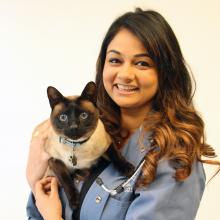It's bizarre how the past three years of vet school have flown by in the blink of an eye. I can still remember being that wide-eyed first year who was keen to learn everything under the sun. Each year was markedly different than the one before, and while the days and weeks seemed to last forever, the months passed by and the next year had arrived before I even knew it.
Phase 3, the final didactic year, was a whirlwind of emotions. While being the most grueling of all the years, it was certainly the most rewarding. After all the long class days, followed by even longer library nights, the light at the end of the tunnel was finally peeking through in sight. As a hands-on learner, I was so excited to end my time in the classroom and get out into the real world to utilize what I had been taught over the last few years.
Entering the clinical side has shown me the stark differences between the classroom and the real world. While being tested through our didactic years, we were always guaranteed that the answer to a problem would be in front of us. We could read about a patient, look at tests done, and come to a conclusion based on the answers under A, B, C, or D. Process of elimination would sometimes be your best friend, and you could breathe a sigh of relief picking the right choice. Now we must ask the right questions, perform and interpret the correct tests, deduce a diagnosis, and come up with a treatment plan, without the answer propped next to that A, B, C, or D.
The transition is difficult, and the learning curve is steep, so what are some ways to ease the process? Here are a few of my tips that I have found helpful so far:
1. Get Involved
Make sure to get involved with as many cases as you can, especially the ones that you find interesting. Even if you have not seen a case from start to finish, the more exposure you can get to things like assessing a patient or interpreting diagnostic results, the more likely you are to identify a similar case in the future. Identifying patterns are important and can jog your brain into remembering something you have seen in the past. Even something as basic as constantly performing physical exams can allow you to differentiate the variations among patients and identify what is normal and what is not. I constantly find myself popping into the imaging room to view radiographs, or assessing blood reports and looking up the history to justify the results that have come back. Sometimes I know the answers and sometimes I don’t, and that is where tips #2 and 3 come in handy!
2. References
As mentioned before, we won’t always know the answer. The world of medicine is so vast, it is impossible to know everything, and there is no shame in that. Here at Hird and Partner’s, I am lucky to have access to a wide variety of textbooks and other references that can be accessed at any time should I need more information. If a procedure is done that I am unfamiliar with, or I come across diagnostic results I can’t quite understand, I always try to use a reference to help clarify so I will have a better understanding if presented with a similar case.
3. Ask questions
As a newbie, it can quite often be daunting to ask questions, but it can be one of the best tools when transitioning. The veterinarians at my externship are great because they constantly ask me questions, forcing me to dig into my brain about what I’ve learned, apply it and jog my memory. There are always times I don’t know the answer, and it helps to ask an individual to go through and explain it to you. I find that discussing these questions makes the answers stick better in the long run. Don’t be afraid to ask questions, no matter how silly you may think they may be!
These tips are definitely not mutually exclusive. I am grateful that the Ontario Veterinary College gives us the opportunity to get delve into the real world of veterinary medicine before we graduate. Although it is a scary transition, I hope that having experiences such as the externship program will help ease this period once I enter the working world!
